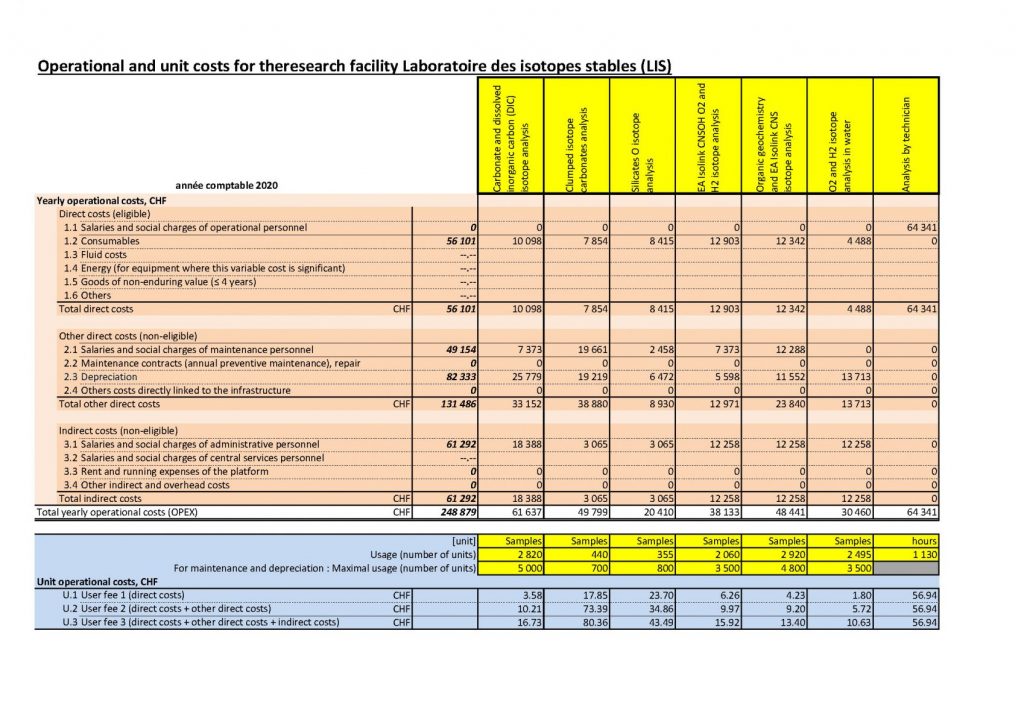The Stable Isotope Laboratories of the Faculty of Geosciences and the Environment house a number of state-of-the-art gas source mass spectrometers and peripheral equipment including complex extraction lines, which are financially supported by the faculty, the university, as well as research and equipment grants of the Swiss National Science Foundation (SNSF). The stable isotope laboratories form part of the backbone of the research in natural sciences and are commonly used by a large number of researchers, research assistants, Masters students and colleagues of IDYST, ISTE, and IGD, but also by other members of the university, as well as numerous external national and international collaborators. In addition, they are integral to the teaching of laboratory techniques, methods and practices in Earth and Environmental Science curricula. For more information on the stable isotope laboratories at UNIL you can simply scroll down further…
Nu Instruments – Clumping Measurements
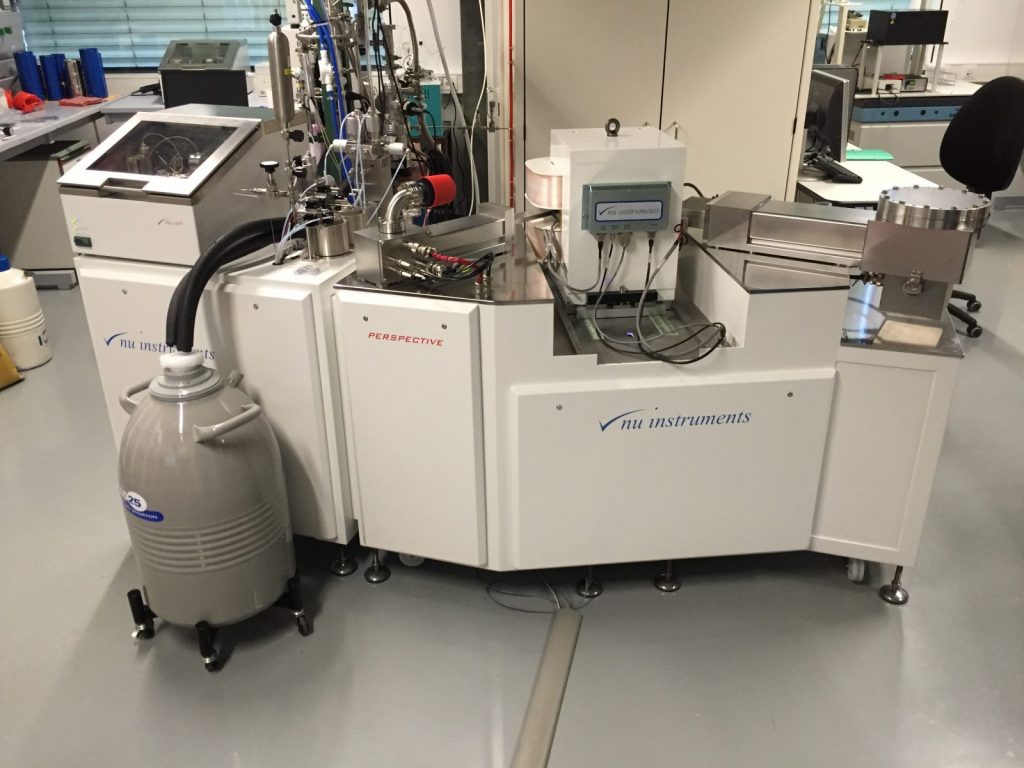
Nu Instruments Perspective for normal dual inlet, automated analyses of the C- and O-isotope compositions, including clumped isotope analyses (d47, D47) of CO2 from carbonates prepared by the NuCarb device.
Contacts :
Laszlo Kocsis (Laszlo.Kocsis@unil.ch)
Torsten Vennemann (Torsten.Vennemann@unil.ch)
MAT 253 – Silicates, Oxides and EA for Hydrous Minerals, Phosphates, Nitrates, Sulphates, Organic Matter H- and O-Isotope Compositions
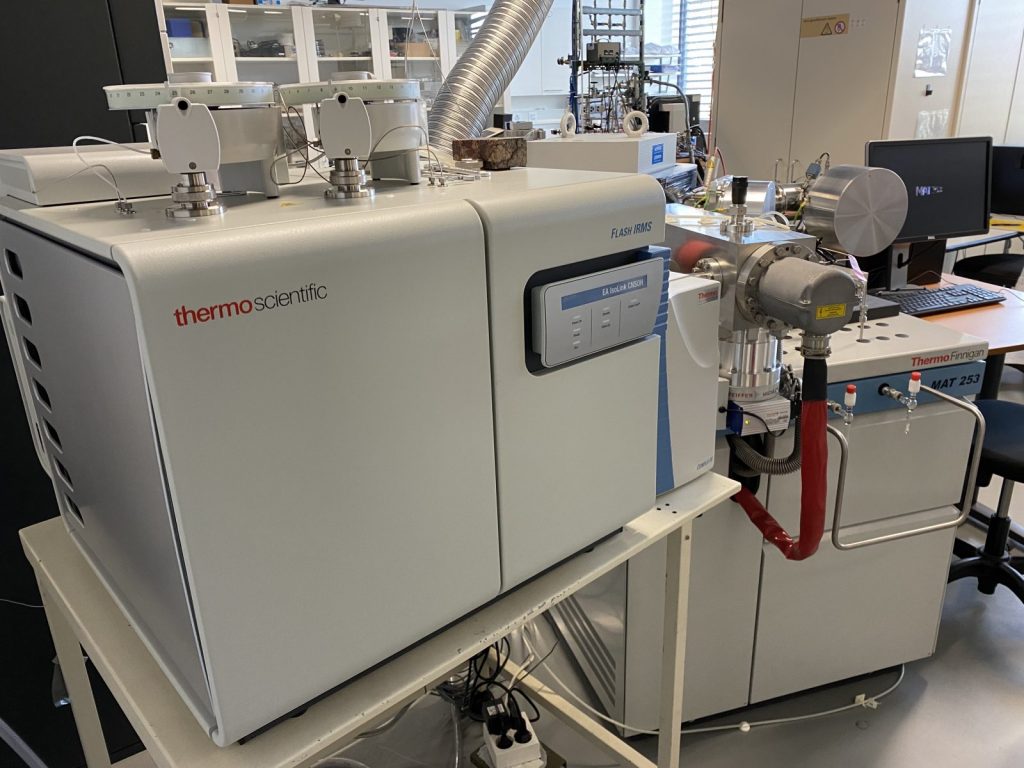
Finnigan MAT 253 for normal dual inlet and carrier gas analyses and on-lineCO2-laser fluorination line for single grain and whole rock analyses of silicates and oxides. This mass spectrometer is also used for H-isotope and O-isotope analyses of waters, organic matter and O-isotope analyses of phosphates, nitrates and sulfates (H-Device; EA-Isolink CNSOH), as well as any offline samples such as CO2 separated from fluid inclusions and/or H-isotope analyses of water from fluid inclusions.
Contacts :
Laszlo Kocsis (Laszlo.Kocsis@unil.ch)
Benita Putlitz (Benita.Putlitz@unil.ch)
Torsten Vennemann (Torsten.Vennemann@unil.ch)
Click here to check for reservations and availability
Delta V – Carbonates, DIC, Water via GasBench and TC/EA Measurements
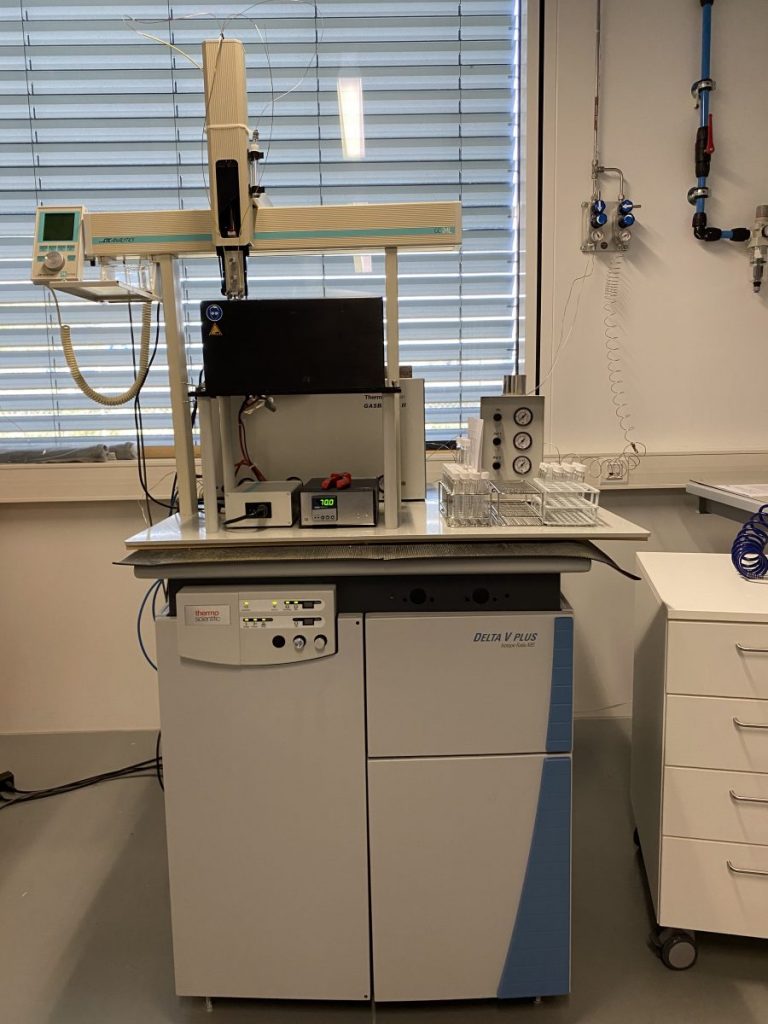
Thermo Finnigan Delta V for carrier gas GasBench II analyses of carbonates (C- and O-isotope compositions), dissolved inorganic carbon and oxygen isotope analyses of waters, as well as on-line TC/EA for hydrogen and oxygen isotope analyses of solids (hydrous minerals, phosphates, sulphates, nitrates, organic matter such as cellulose), liquids (waters).
Contacts :
Laszlo Kocsis (Laszlo.Kocsis@unil.ch)
Torsten Vennemann (Torsten.Vennemann@unil.ch)
Click here to check for reservations and availability
Delta V and EA’s for C, N, S Isotope Measurements of Organic Matter and Minerals
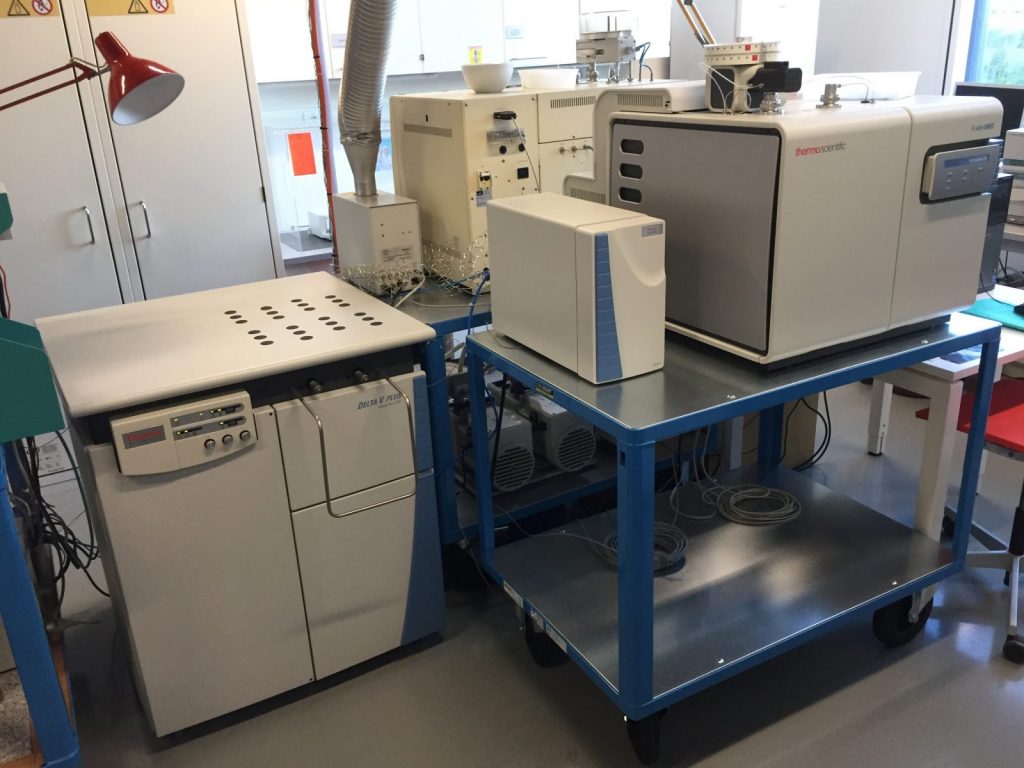
Thermo Scientific Delta V for dual inlet and carrier gas analyses and on-line EA for bulk sulphur, carbon, and nitrogen isotope analyses in sediments, minerals and rocks, GC and GC-TC combustion for molecular-specific analyses of hydrogen, carbon, oxygen and nitrogen isotope analyses.
Contacts :
Jorge Spangenberg (Jorge.Spangenberg@unil.ch)
Torsten Vennemann (Torsten.Vennemann@unil.ch)
Click here for reservations and availability
Picarro CRDS for H and O Isotope Measurements of Water
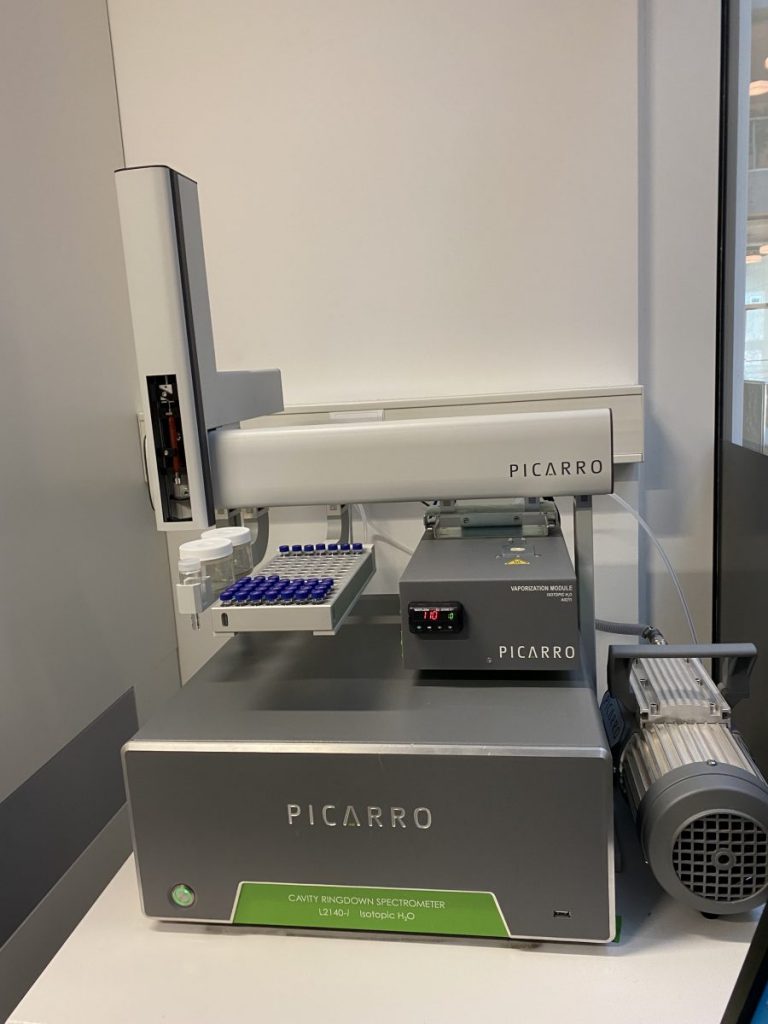
Picarro L1102i and L2140i (H2O) – WS-CRDS (Wavelength-Scanned Cavity Ring Down Spectroscopy system) – a laser-based analyses that is very precise for the hydrogen and oxygen isotope analyses (including 18O/16O and 17O/16O) of only small amounts of water.
Contacts :
Micaela Faria (Micaela.Faria@unil.ch)
Laszlo Kocsis (Laszlo.Kocsis@unil.ch)
Torsten Vennemann (Torsten.Vennemann@unil.ch)
Click here for reservations and availability
Stable Isotope Analyses in the Isotope Laboratory of the University of Lausanne
The stable isotope laboratory has facilities for the routine analyses of the stable isotope compositions of H-, C-, N-, O-, and S-isotopes, including but for special requests only, compound-specific analyses of organic matter.
Routine analyses include:
(1) H- and O-isotope analyses of water using a Picarro L2140i CRDS, but in exceptional cases this also possible with the H-Device, GasBench II, or TC-EA.
(2) C- and O- isotope analyses of carbonates (including d47 and D47), carbonate in phosphate and dissolved inorganic carbon (NuCarb linked to a Nu-Instruments Perspective or GasBench II linked to a Delta V).
(3) H-isotope analyses of hydrous silicates and bulk organic matter using either a TC-EA or EA Isolink CNSOH linked to the MAT 253.
(4) O-isotope analyses of phosphate, sulfate, nitrate, and bulk organic matter using the TC-EA or EA Isolink CNSOH (and MAT 253) but where the samples require chemical preparation before (analyzed as Ag3PO4, BaSO4, or AgNO3).
(5) C-, N-, or S-isotope analyses of bulk organic matter, whole rock samples, nitrates, or sulfides and sulfates using an EA Isolink CNS and a Delta V.
(6) O-isotope analyses of silicates and oxides using a CO2-laser extraction line and fluorination linked to the mass spectrometer (MAT 253 and Nu-Instruments Perspective).
For further information on these routine analyses please contact the director of the laboratory directly (Torsten Vennemann):
Given the large number of users for the facilities, it is our policy that each user can reserve the machines for their analyses a maximum of two months in advance and for not more than three days per week. Please see below for further guidelines.
Other analyses include compound-specific (GC or GC-IRMS) stable isotope analyses of organic compounds and volcanic, atmospheric or fluid inclusion gases, off-line preparation of gases from carbonates, atmospheric CO2, N2, water or water vapor, including fluid inclusion extractions of these gases in a vacuum system. For these special type of analyses contact Jorge Spangenberg (compound-specific analyses and organic geochemistry) or Torsten Vennemann (vacuum extraction of gases and fluid inclusion analyses).
Two general types of analyses are done in our laboratories (with different prices for these analyses):
(a) internal analyses with samples prepared by researchers of Lausanne/Geneva
(b) and (c) collaborative analyses for external users or commercial societies.
(a) internal analyses
- We request a short proposal, detailing the problem, what data are already available, what the isotope analyses are expected to contribute, and how many samples are to be run. This short proposal is to be transmitted to the director together with the request for the analyses to be done.
- Reservations of the equipment will then be made according to the number of analyses requested. Reservations can be made a maximum of two months prior to analyses and a maximum of three days per week can be reserved for any one project. If the time schedule allows, short-term reservations can also be made a day or so in advance of the analyses. Experienced users can also run the samples over the weekend by themselves (see below).
- Samples must be ready for analysis and must be prepared according to our instructions by the researcher him- or herself. The researcher is also responsible for weighing in the samples for analyses. Experienced users, familiar with the measurements (PhD students and post-doctoral researchers for example) are encouraged to learn the techniques and to run the samples by themselves too.
- Analytical data are to be reduced by the researcher of the project (according to our instructions).
- It is expected that the analytical expenses are covered by the researchers of the project, the PhD students or their directors. For users within ELSTE the internal price applies, given that the samples are prepared by the users themselves; for the costs please see our price list on the internet (see also below).
- If the analyses are done in collaboration with a responsible of the laboratory, and the responsible is also involved in the scientific discussion of the data obtained in our laboratory, the responsible in charge of the analyses is to be included as co-author on the publications using the data.
(b) external scientific collaboration:
- We request a short proposal, detailing the problem, what data are already available, what the isotope analyses are expected to contribute, and how many samples are to be run. This short proposal is to be transmitted to the director together with the request for the analyses to be done.
- Reservations of the equipment will then be made by the contact persons (responsible). Reservations can be made a maximum of two months prior to analyses and a maximum of three days per week can be reserved for any one project.
- Samples must be ready for analysis and must be prepared according to our instructions by the researcher him- or herself.
- Analytical data are to be reduced by the researcher of the project (according to our instructions).
- It is expected that the analytical expenses are paid for by the researchers of the external collaborations; external prices are applicable, in particular if the samples still have to be prepared and weighed in by ourselves. Internal prices apply only if the project is done in close collaboration with any one of the responsibles of the laboratory. Please see our price list on the internet (also given below).
- If the analyses are done in collaboration with a responsible of the laboratory, that is if the responsible is also involved in the scientific discussion of the data obtained in our laboratory, the responsible in charge of the analyses is to be included as co-author on the publications using the data.
- Academic institutions are given priority while other institutions are considered case by case.
(c) Commercial contracts:
The same points as those listed under (b) above apply. But in addition the following points are relevant:
– Final analyses and supporting documentation are sold to commercial clients (see our price list for external prices)
– Our laboratory is responsible for analytical quality
– After completion of the project, all remaining sample material will be sent back.For any additional information regarding the Stable Isotope Laboratory of the University of Lausanne, please contact Torsten Vennemann (Torsten.Vennemann@unil.ch).
Price List for Routine Analyses in the Stable Isotope Laboratory of the University of Lausanne
Internal prices cover the analytical costs only and apply to collaborative research projects where the student/researcher performs the complete analyses. External prices are for analytical service and include costs for analytical personnel.
Contacts: Prof. T. Vennemann (Torsten.Vennemann@unil.ch); Dr. L. Kocsis (Laszlo.Kocsis@unil.ch); Dr. Benita Putlitz (Benita.Putlitz@unil.ch); Dr. Jorge Spangenberg (Jorge.Spangenberg@unil.ch).
